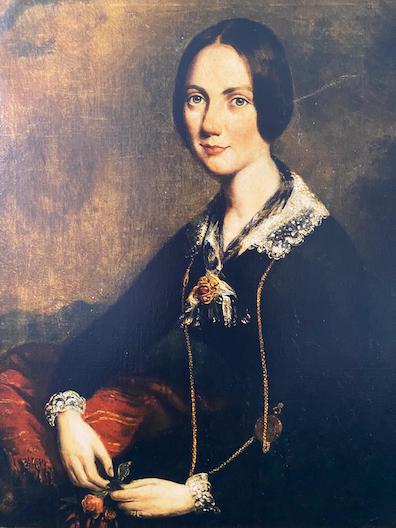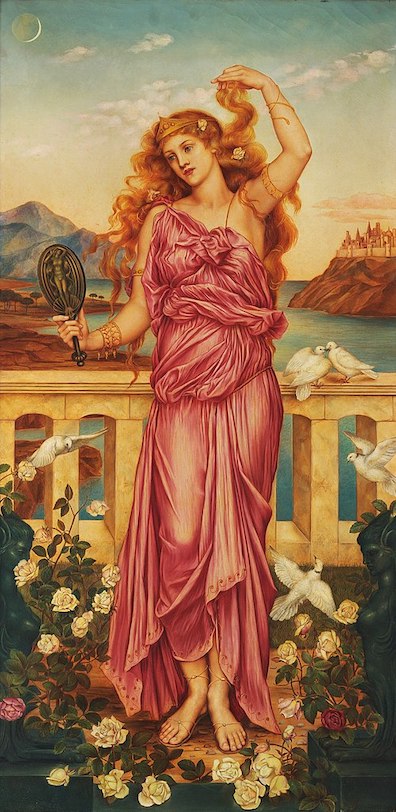Telling a traditional (but highly obscure) riddle to the boys
in Nestor, Stephen changes one word in the answer:
"The fox burying his grandmother under a hollybush."
And this is strange, because the riddle seems tailor-made to
communicate his fear that he has killed his mother.
One understanding of the enigma might be sought in Stephen's
need to mask
the guilt he is expressing. But recently another
explanation has been proposed: that Joyce is importing Helen
of Troy, the cause of Homer's great war, into his narrative by
alluding to his own grandmother.
In Helen of Joyce (2022), Senan Molony suggests that
the fox burying his grandmother under a holly bush is code for
Joyce burying his grandmother under the surface of the text.
Helena O'Connell, known as Ellen, married James Augustine
Joyce on 29 February 1848. She died in 1881, eight months
before the writer was born, but she was uncommonly beautiful
and had a name to match. Molony argues that the long Greek
siege of Troy prompted by Paris's abduction of Menelaus's
wife––represented in the Iliad and referenced often in
the Odyssey––informs Joyce's story of the invasion of
the Bloom home by an adulterous lover. In this retelling Molly
is Helen, but Homeric analogues attach themselves to different
Dubliners in different ways as the novel proceeds, and in Nestor
Joyce wanted to introduce a central archetype long before
Molly herself appears.
There are many pieces of evidence to support the claim. The
fox whose grandmother it is must be Stephen: he is preoccupied
with his dead mother; he is called a "dogsbody"
in Telemachus; in Proteus he identifies with a
dog who digs in the sand. Joyce lashes these associations
tightly to the riddle just before the answer is announced: "Stephen,
his throat itching, answered: / — The fox
burying his grandmother under a hollybush." Why the odd
detail? Molony points to the Aesopian fable that Lenehan reads
to Miss Kennedy in Sirens, in which a fox has an
irritated throat: "Ah fox met ah stork. Said thee fox
too thee stork: Will you put your bill down inn my troath
and pull upp ah bone?" Stephen is still thinking
of the fox in Circe, changing the words of the riddle
slightly ("The fox crew, the cocks flew") and linking the
animal to matricide: "Thirsty fox. (He laughs loudly.)
Burying his grandmother. Probably he killed her." In
Molony's view the identification is strengthened by the
pseudonym of Charles Stewart Parnell, Mr. Fox, which also
comes up in Circe.
A few moments before he poses the riddle in Nestor,
Stephen thinks of the nights he spent reading in the Ste.
Geneviève library, "sheltered from the sin of Paris."
Again, Joyce's additon of this detail is odd, because Stephen
neither required nor sought "shelter" from prostitutes. Molony
suggests that the literal sense is less important than the
phrase's symbolic suggestion of a Trojan prince stealing a
Greek wife. Why "under a hollybush"? That detail is
part of the traditional riddle, but Molony notes the
evergreen's association with "Yule," which sounds like Ulysses,
the text in which Helena Joyce is being buried. And there are
hints too in the couplet that enters Stephen's mind before he
poses the riddle: "Riddle me, riddle me, randy ro. / My
father gave me seeds to sow." Molony
remarks that "The seeds, or generations, are on Joyce's
father's side, leading to his paternal grandmother. These are
seeds to the solution (while the old Dutch verb Helen,
archaic German Hehlen, meant to conceal, even to
bury)" (32).
Any one of these claims might be challenged as overingenious
reading of an isolated detail, but collectively they are
persuasive, especially when one reads to the end of the
chapter. Mr Deasy begins his misogynistic list of femmes
fatales with a Biblical archetype and a Homeric one: "A
woman brought sin into the world. For a woman who was no
better than she should be, Helen, the runaway wife of
Menelaus, ten years the Greeks made war on Troy." Joyce
had an abiding fear of female infidelity that he mined for
artistic effect: he was devastated by Vincent Cosgrave's
insinuation that Nora had a liaison with him in Joyce's
absence; he made Gretta Conroy's revelation to Gabriel of a
previous lover the basis of one of the greatest short stories
in the English language; he tried to make Ibsen-like drama out
of the attraction between Bertha and Richard Rowan's friend
Robert. All these earlier versions of infidelity were shot
through with ambiguity, but Ulysses tells the story of
actual adultery. The Penelope of the Odyssey is an
imperfect vessel for that message, but the Helen who lies
behind the Iliad is a perfect one. It makes sense that
Joyce would have found a way to include her in his epic.

